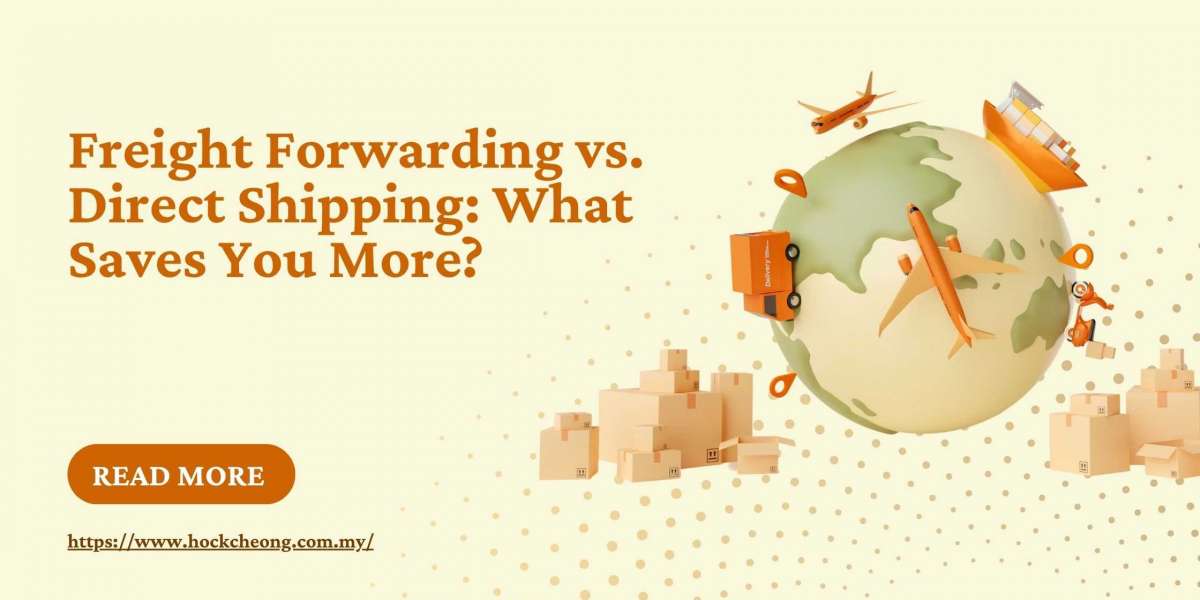What is Freight Forwarding?
Freight forwarding is a logistics service that acts as an intermediary between shippers and various transportation services, including air freight, sea freight, road transport, and even rail. Freight forwarders manage the entire shipping process on behalf of the customer, from booking cargo space to preparing documentation, customs clearance, warehousing, and tracking.
In essence, freight forwarders don’t move goods themselves but use their network of carriers and partners to find the best, most cost-efficient route for their client’s shipment.
Key Services Offered by Freight Forwarders:
- Arranging transportation
- Consolidating shipments
- Preparing import/export documents
- Handling customs clearance
- Providing cargo insurance
- Warehousing and storage
What is Direct Shipping?
Direct shipping refers to sending goods straight from the seller to the buyer without using any intermediaries. This method typically involves working directly with a shipping line or courier company. It’s a more hands-on approach, where the seller handles all aspects of the logistics process—including paperwork, carrier negotiations, and customs regulations—independently.
Direct shipping is often preferred for smaller shipments or when the seller wants full control over the logistics process.
Common Use Cases:
- E-commerce businesses shipping directly to customers
- Companies with in-house logistics teams
- Small shipments with simple routing
Cost Comparison: Freight Forwarding vs. Direct Shipping
Let’s break down the cost implications of both options.
- Shipping Rates and Carrier Negotiations
- Freight Forwarding: Freight forwarders often have established relationships with multiple carriers, allowing them to negotiate bulk discounts and better rates. They can also combine your shipment with others to reduce the overall cost through consolidation.
- Direct Shipping: You may not benefit from volume discounts unless you're a high-volume shipper. Shipping rates may be higher if you're booking as a single customer without a long-term contract.
✅ Advantage: Freight Forwarding
- Documentation and Customs Fees
- Freight Forwarding: Forwarders are experts in international trade regulations and handle customs paperwork accurately, reducing the risk of costly delays or fines.
- Direct Shipping: Errors in documentation or unfamiliarity with customs processes can result in extra fees, shipment delays, or penalties.
✅ Advantage: Freight Forwarding
- Time and Labor Costs
- Freight Forwarding: Saves you time and internal resources. Instead of managing every detail, you outsource the logistics to professionals.
- Direct Shipping: Requires your team to spend time dealing with logistics, which can lead to hidden costs in labor hours and operational inefficiencies.
✅ Advantage: Freight Forwarding
- Hidden Costs and Risks
- Freight Forwarding: Some forwarders charge service fees, but they often offset those by saving you from unexpected costs (e.g., demurrage, detention, or missed customs filings).
- Direct Shipping: The risk of mistakes is higher without expert oversight, and that can lead to surprise expenses that impact your bottom line.
✅ Advantage: Freight Forwarding
- Scalability
- Freight Forwarding: Easily scalable. As your business grows, a freight forwarder can handle increasingly complex shipping needs.
- Direct Shipping: May become inefficient or overwhelming as volume increases, especially across multiple countries.
✅ Advantage: Freight Forwarding
When Is Direct Shipping More Cost-Effective?
While freight forwarding has many cost-saving advantages, there are certain scenarios where direct shipping might be the better financial choice:
- For small, domestic shipments where customs handling isn’t a factor.
- For e-commerce businesses doing dropshipping, where suppliers ship directly to the customer.
- If you have in-house logistics expertise that can manage the process efficiently.
- For repeat shipments along the same route, where the logistics are already optimized.
In such cases, avoiding the additional service fees charged by a freight forwarder can lead to savings.
Final Verdict: Which One Saves You More?
For most businesses dealing with international shipping or complex logistics, freight forwarding offers more long-term savings, efficiency, and peace of mind. The ability to consolidate shipments, access better rates, ensure compliance with customs regulations, and free up internal resources makes freight forwarders a valuable investment.
However, for small, simple shipments—especially within a single country—direct shipping may be more cost-effective and sufficient.
Conclusion
Choosing between freight forwarding and direct shipping depends on your business size, shipment complexity, and resource availability. If you want a streamlined process that minimizes risk and potentially saves more money through professional logistics management, freight forwarding is likely your best bet.
On the other hand, if you have a reliable, simplified supply chain and can manage logistics yourself, direct shipping can be a lean and agile option.
In either case, understanding the pros and cons of each approach helps you make smarter logistics decisions—boosting efficiency and improving your bottom line.







